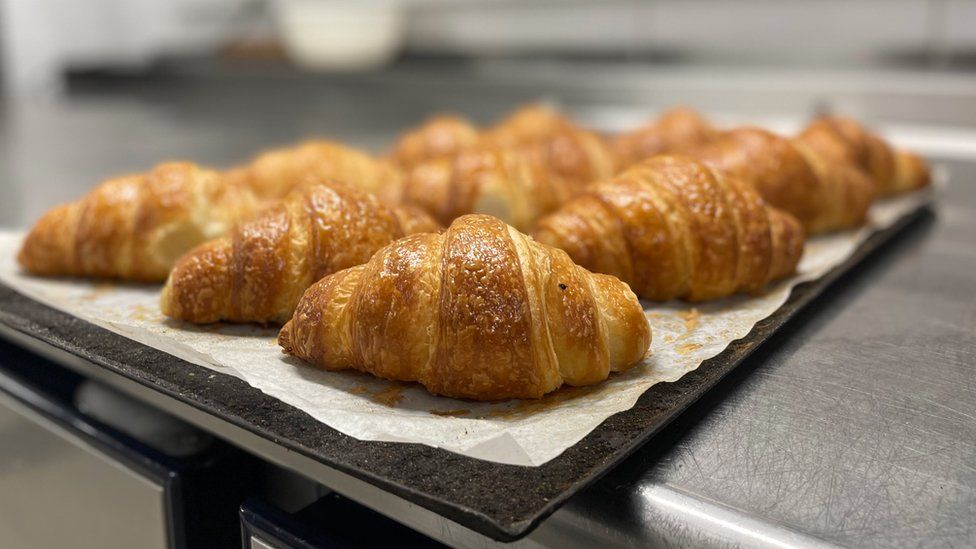ARTICLE AD BOX

These croissants are for sale in a dairy-free bakery in Paris
By Andrew Harding
BBC News, in Paris and Roy-Boissy, Oise, France
There it sits, in all its flaky glory, with a crust the colour of autumn leaves, and two plump claws almost begging to be torn off and devoured. Light as air and as French as the guillotine.
One impeccable croissant.
But this particular pastry - among dozens crowding a display shelf in an unremarkable looking boulangerie in central Paris - is no ordinary offering. Far from it. For this is a butter-free croissant, a crisp swerve away from more than a century of devout culinary tradition and a nod towards larger forces seeking to reshape French food and agriculture.
Sacrilege has rarely looked so seductive.
"I'm changing the world," grinned Rodolphe Landemaine, between mouthfuls of a lovingly laminated, butter-free, pain au chocolat.
Landemaine, a baker, now owns five busy boulangeries in Paris, with more on the way in other French cities, all serving entirely dairy-free products to a mostly local clientele.
Not that he advertises the absence of butter, or eggs, or cows' milk, in his shops. Indeed, the word "vegan" never crosses his lips.
"It's not an easy word for French people to get used to. It's very difficult for them to give up on butter and eggs," he acknowledged, explaining that the idea of veganism is considered too "militant" for many.
Instead, Landemaine, a vegan with an interest in animal welfare and climate change, has adopted a stealthier approach, hoping customers will fall in love with his croissants, madeleines, quiches, sandwiches, flans and pains au raisins before they realise, too late, that butter has been replaced with a secret blend of plant-based products.
Baker Rodolphe Landemaine is a vegan and exploring dairy-free alternatives to traditional ingredients
And if he can persuade conservative French taste buds to tolerate croissants "sans beurre" then perhaps, the argument goes, anything is possible.
As if on cue, a young boy walked past us, clutching the remains of a flaky claw, which he loudly declared to be délicieux.
"It tastes lighter," said a musician named Anne, 42, nibbling the end of her croissant.
"It's really good. I don't think I would recognise the difference," said Marta, a visitor from Poland, of her pain au chocolat. She's not a vegan but noted that she often got a scathing look from French waiters if she ordered oat milk with her coffee.
"I see the judgement in their eyes because it's just not part of their culture," she added.
For a country grappling with all sorts of new influences, such as challenges to its long-standing policy of state secularism, or le wokisme of imported "Anglo-Saxon" culture wars, a few unusual pastries can hardly be considered a major threat.
And yet the issue brushes some raw nerves here, from French people's deep but evolving relationship with the terroir or land, to the escalating farmers' protests across Europe, to the upheavals brought on by climate change commitments, to France's almost religious devotion to certain culinary customs. And all this in the shadow of June's European Parliament elections, which look likely to usher in big gains for far-right parties in France and beyond.
"Not for me, no way," said Thierry Loussakoueno, with mild indignation, appalled by the very idea of a butter-free croissant.
Thierry Loussakoueno was among the judges at a recent croissant competition
Loussakoueno was busy, one recent morning, judging a traditional croissant competition in a wood-panelled conference room close to the River Seine in central Paris. The event, one among dozens, was organised by the Paris office of the French Union of Bakers and Pastry Makers and sponsored by a group of dairy farmers from south-west France. The French food industry has a collective reputation for being highly organised, conservative, and quick to self-defend.
"I don't understand these vegan pastries. I can understand people who don't eat meat for whatever reason, and I respect this completely. But dairy products and butter are just too important in the taste of food and not using them is just too bad and a pity," said Loussakoueno, a Parisian civil servant.
Other judges and competitors, sniffing and prodding a succession of crescent-shaped creations, spoke of the need to protect French farmers.
"It's difficult for me to even talk about making a croissant without butter. There's a whole family who are behind this - lots of people involved in the process," said Olivier Boudot, a cookery teacher.
The milk from this farm near Amiens is sold to a butter factory
An hour's drive northwest of Paris, near Amiens, in a large barn surrounded by gentle green hills, a muscular, 700kg Holstein cow manoeuvred herself into an automated milking enclosure, watched by her owner, Sophie Lenaerts.
"Amazing machines," said Lenaerts, as a mechanical arm swung four suction cups beneath the cow, who was casually relieved of a dozen litres of milk, destined for a nearby butter factory.
Sophie Lenaerts keeps a herd of Holstein dairy cows
Lenaerts, 57, has more pressing concerns than the perceived threat of vegan croissants sold to metropolitan consumers. And yet the issue rankles.
Like many small farmers in France and beyond, she has spent much of the past few months angrily organising protests against a European Union-wide agricultural system which she feels is destroying her industry. She's planning another trip to Brussels this month to help block roads near the European Union's headquarters.
Sitting later in her snug farm kitchen, Lenaerts railed against imports of cheaper, sub-standard foreign food goods, against the huge mark-ups that distributors and middlemen impose on her produce, and against the sense that farmers are too often left as scapegoats for all climate-related issues.
"I have grandchildren. I want the best planet for everyone. But it's always the farmer that gets the blame," she said.
Vegan croissants were, for her, merely an indicator of the broader "industrial madness" that involves shipping unusual foods around the globe in order for "certain food companies" to make a profit. A combination of cynicism and virtue-signalling.
Lenaerts suggests everyone make a small effort to eat well
Lenaerts looked through a rain-speckled window towards her fields. Ninety-eight percent of her cows' food is produced on the farm. Almost all the food her family eats is bought from her neighbours, just a cycle-ride away. Surely, she explained, this is the way to tackle climate change, and a host of other challenges. Instead, this "virtuous circle" is already on the brink of extinction.
"The fear of losing French agriculture is the fear of losing our heritage, our land. It's the farmers that maintain our landscape and make France a country for tourism. When no farmers are left, when no cows are left, it will be much worse. (But) I think we're at a turning point in terms of awareness," Lenaerts continued, pointing to strong public support for the recent farmers' protests.
"If everyone makes a small effort to eat well, to pay attention to what they're buying, things should go in the right direction."
There are some encouraging signs of that.
The team at Datil, which has been awarded a Michelin star
Off a narrow street in the fashionable Marais district of Paris, six women stood, in solemn concentration, in a gleaming restaurant kitchen, carving up the morning's delivery of plump asparagus spears, salad heads, kumquats, and radishes.
Gliding between them, the owner and chef, Manon Fleury, was still basking in the delight of being awarded a first Michelin star for her restaurant, Datil, in March. Fleury, once a junior fencing champion, has received a lot of attention in France for her energetic attempts to challenge a male-dominated restaurant industry, but her cooking - with a focus on "mostly vegan, poetic" recipes - is also seeking to nudge French food culture in a new direction.
Hers is by no means the only restaurant of its kind in Paris, but visitors - including the millions soon to descend on the city for the Olympic Games in July - may notice the extent to which meat and dairy-loving France lags far behind London, for example, in offering even the barest nod towards vegetarian options.
"The French tradition is quite heavy," Fleury admitted.
She acknowledged the cost involved in trying to break away from larger suppliers and sticking to a smaller network of trusted organic farmers.
"There is more and more interest in this kind of cuisine, but it has to be in harmony and balance," Fleury said, trying to sound both reassuring and radical at the same time.
"Sometimes you have to be radical to change the world," she said.
Manon Fleury focuses on vegan food in her restaurant in Paris
"Yes, kind of. But with a lot of kindness."
Back at the bakery, perhaps 15 minutes by bicycle from Fleury's restaurant, the morning rush of customers was slowing down. One last, lonely, croissant sat waiting behind glass. Landemaine, the owner, said his business was growing fast, with new outlets opening soon in Bordeaux, Lyon and Rennes, with strong interest from the UK, Dubai and elsewhere.
But perhaps more significant was the notice that he said other French food companies were taking in his success.
"They sense the market is changing. One reason (for their interest) is that butter has been so expensive for several years," he said.
Still, Landemaine acknowledged that the road ahead remained steep.
"It's changing. But not so quickly," he said, as one of his bakers emerged from the basement kitchen, carrying a tray laden with dark, light-as-air, butter-free, chocolate tarts.

 8 months ago
49
8 months ago
49








 English (US) ·
English (US) ·